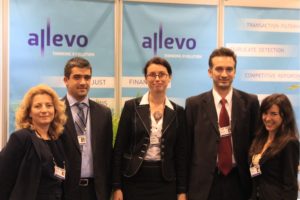Vienna – Hong Kong – Amsterdam – Toronto
Toronto was our 4th consecutive achievement as being one of the exhibitors at Sibos. And the first under the Allevo umbrella, which, surprisingly enough, everybody was aware of, so we did not have a lot of trade name rebranding explaining to do.
A very short history of these last 4 Sibos-es was stated by Gottfried Leibbrandt ( @GeoLeib) at the closing plenary: Vienna was about denial and disbelief, Hong Kong was about anger, Amsterdam was about acceptance and Toronto is about action.
The plenaries & the rest of the sessions opened up some subjects for debate. There were stated things such as follow the money, as money’s moving East; Brazil is going to rise as one of the strongest countries; banking isn’t about a place you go anymore, it’s about a thing you do; innovation means make it relevant, make it simple; SEPA end-date; mobile payments; etc.
The best thing about all these sessions is that they can be watched through the Virtual Sibos platform till the end of the year. Thus a super busy Sibos participant can see of his or her own agenda with a lighter heart in regards to sessions missed. Exceptions are the more interactive sessions for which the experience cannot be reproduced online, such as Innotribe’s unconferenced events. These alone generated a number of tweets considerably higher than those of Sibos itself.
And what novelties did we bring to the table?
Every year we make sure we have at least one or two new catchy things to show off with. This year we brought a new signature-based biometric identification mechanism integrated into our qPayIntegrator. It is a very catchy gadget used not only to authenticate and authorize users into the system, but also to approve high value payments exceeding a certain amount. Unlike most other biometric identification methods out there, this one is based as well on the dynamics of the signature, not just on its shape.
Another cool thing we showed up with is our solution for corporations. For large companies, paying lots of suppliers, taxes, wages and so on and keeping a third eye on their multitude of bank accounts, a product on which they can rely on for automating and centralizing all these day to day operations can be a gold mine: one single window to the banking world.
Last, but not least, we revealed our idea for our next major project: publishing qPayIntegrator under free GPL license. Of course, this is an initiative which will take time to come to life, but we’ve started gathering our customers’ and partners’ feelings about it. I was glad to hear all the go-for-it types of reactions and I was even happier to hear the don’t-even-think-about-it ones – some aren’t too thrilled with the idea and I can understand why.
The subject was approached in a round-table discussion organized by Allevo, in which people debated what it would mean to bring this free open source software model into the payments arena. It seems to be a good lead and we’ve set our minds on going down this road.
Corina Mihalache was a panelist in the “Financial interoperability and open source” session; she made a high level approach, explaining how our idea can enhance interoperability and cooperation between various entities of the financial industry.
Today I can say that the project has officially been kicked-off within our company and I cannot wait for the go to market phase. I think there’s going to be loud noise around its launch, with truly disruptive consequences in this ecosystem of banks and corporations and MFIs and SSBs.










